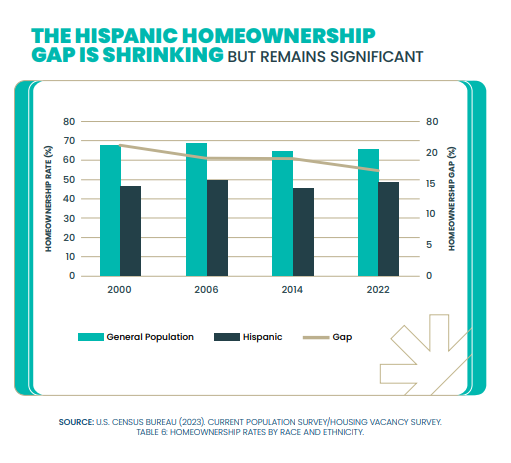The data shows that the Hispanic homeownership gap is shrinking but still significant. From 2000 to 2022, the homeownership rate for Hispanics has increased, indicating progress but also highlighting that there’s still a disparity compared to the general population. This trend is crucial as homeownership significantly contributes to wealth building, as noted in the 2023 State of Hispanic Wealth Report. Owning a home boosts net worth and provides financial stability.
Realtors play a vital role in this journey, serving as the front line for renters aspiring to become homeowners. They provide essential guidance and resources to help navigate the homebuying process. For those looking to close this gap and build wealth, consider the benefits of homeownership and seek guidance from experts.
Mark Pinilla, an investment property manager and Realtor, can guide you towards homeownership and financial success. His expertise can provide valuable support and direction, helping to secure a stable and prosperous financial future.
Contact Mark Pinilla for professional guidance in your journey to homeownership and wealth building.
#HispanicWealth #Homeownership #WealthBuilding #FinancialSuccess #LatinoSuccess #PropertyInvestment #RealEstate #MarkPinilla #CloseTheGap #InvestInYourFuture

Los datos muestran que la brecha de propiedad de vivienda hispana está disminuyendo, pero sigue siendo significativa. Desde 2000 hasta 2022, la tasa de propiedad de vivienda para los hispanos ha aumentado, lo que indica progreso pero también destaca que aún existe una disparidad en comparación con la población general. Esta tendencia es crucial ya que la propiedad de vivienda contribuye significativamente a la creación de riqueza, como se menciona en el Informe de Riqueza Hispana de 2023. Poseer una vivienda aumenta el patrimonio neto y proporciona estabilidad financiera.
Los agentes inmobiliarios juegan un papel vital en este viaje, sirviendo como la primera línea para los inquilinos que aspiran a convertirse en propietarios de viviendas. Proporcionan orientación y recursos esenciales para ayudar a navegar el proceso de compra de una vivienda. Para aquellos que buscan cerrar esta brecha y construir riqueza, consideren los beneficios de ser propietarios de vivienda y busquen la orientación de expertos.
Mark Pinilla, un administrador de propiedades de inversión y Realtor, puede guiarlo hacia la propiedad de vivienda y el éxito financiero. Su experiencia puede proporcionar apoyo y dirección valiosos, ayudando a asegurar un futuro financiero estable y próspero.
Contacte a Mark Pinilla para obtener orientación profesional en su camino hacia la propiedad de vivienda y la creación de riqueza.
#RiquezaHispana #PropiedadDeVivienda #ConstrucciónDeRiqueza #ÉxitoFinanciero #ÉxitoLatino #InversiónInmobiliaria #BienesRaíces #MarkPinilla #CerrarLaBrecha #InvierteEnTuFuturo


